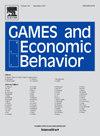From monopoly to competition: When do optimal contests prevail?
IF 1
3区 经济学
Q3 ECONOMICS
引用次数: 0
Abstract
We study competition among multiple contest designers in a general model. The goal of each contest designer is to maximize the sum of efforts of the contestants participating in their contest. Assuming symmetric contestants, our main result shows that the optimal contests in the monopolistic setting (i.e., those that maximize the sum of efforts in a model with a single contest designer) form an equilibrium in the model with competition. Under a very natural assumption, these contests are dominant, and the equilibrium that they form is unique. Moreover, the equilibria with the optimal contests are Pareto-optimal even when other equilibria emerge. In many natural cases, they also maximize the social welfare. Additional examples show that, with further generalizations of our model, optimal contests no longer prevail. Our results therefore highlight and clarify the borderline between settings in which optimal contests prevail and do not prevail.
从垄断到竞争:最优竞争何时盛行?
我们在一个一般模型中研究多个竞赛设计者之间的竞争。每个比赛设计者的目标都是最大化参赛者在比赛中的努力总和。假设竞争对手是对称的,我们的主要结果表明,在垄断环境下的最优竞争(即那些在具有单个竞赛设计者的模型中最大限度地提高努力总和的竞争)在具有竞争的模型中形成均衡。在一个非常自然的假设下,这些竞争占主导地位,它们形成的平衡是独一无二的。此外,即使存在其他均衡,具有最优竞争的均衡也是帕累托最优的。在许多自然情况下,它们也最大化了社会福利。其他的例子表明,随着我们模型的进一步推广,最优竞争不再盛行。因此,我们的结果强调并澄清了最优竞争盛行和不盛行的设置之间的界限。
本文章由计算机程序翻译,如有差异,请以英文原文为准。
求助全文
约1分钟内获得全文
求助全文
来源期刊

Games and Economic Behavior
ECONOMICS-
CiteScore
1.90
自引率
9.10%
发文量
148
期刊介绍:
Games and Economic Behavior facilitates cross-fertilization between theories and applications of game theoretic reasoning. It consistently attracts the best quality and most creative papers in interdisciplinary studies within the social, biological, and mathematical sciences. Most readers recognize it as the leading journal in game theory. Research Areas Include: • Game theory • Economics • Political science • Biology • Computer science • Mathematics • Psychology
 求助内容:
求助内容: 应助结果提醒方式:
应助结果提醒方式:


